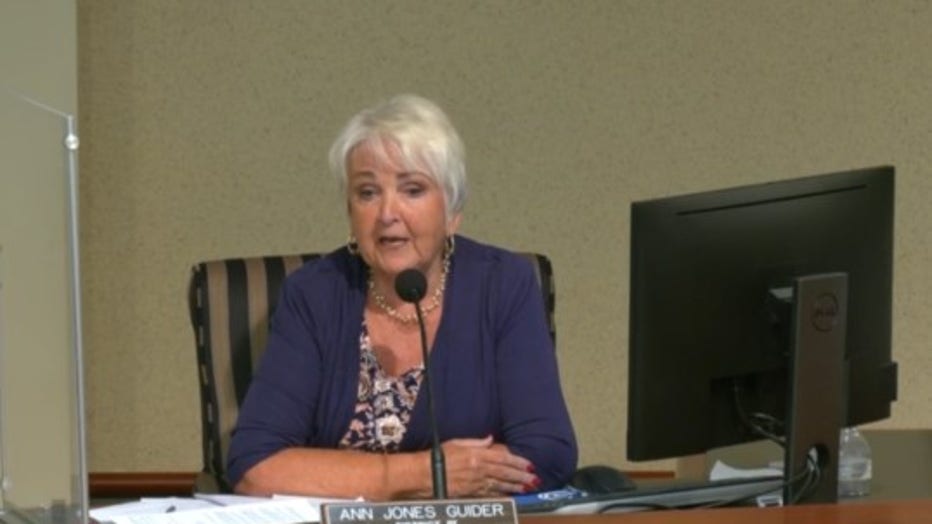GA Supreme Court says no again to suspension of Douglas County judge
In its complaint, the JQC included images of Judge Christina Peterson's official social media pages promoting her part-time acting career. Authorities argue it violates the Judicial Code of Conduct.
DOUGLASVILLE, Ga. - Georgia’s Supreme Court once again denied a request to temporarily suspend Douglas County Probate Judge Christina Peterson.
For a largely mundane job that mostly involves wills and weddings, birth and death certificates, Peterson and the Judicial Qualifications Commission have squared off in dramatic prose.
The judicial investigative panel argued Peterson is "an immediate and substantial threat of serious harm to the public."
Her attorney Lester Tate countered with a demand for the JQC to "put up or shut up."
But thanks to a Supreme Court ruling not to at least temporarily suspend Peterson until trial, nothing much will change anytime soon.
Peterson was first elected in November 2020.
Georgia Supreme Court says no again to suspension of Douglas County judge
In her short time on the bench, Douglas County Probate Judge Christina Peterson has become a lighting rod of controversy. Georgia’s Supreme Court once again denied a request to temporarily suspend Peterson.
In her short time on the bench, Peterson has become a lighting rod of controversy. The JQC accused her of wrongly pressuring her neighborhood homeowners' association in a public meeting to settle a lawsuit she filed.
The judge ordered a mom jailed for contempt simply because she tried to update her marriage license with the name of her recently discovered real father.
And Peterson was scolded by the Douglas County Sheriff for ignoring his orders and opening the courthouse for a Saturday wedding, even though no deputies were on hand to screen visitors.
"If you don’t go through the screening station and you’re a citizen you can drop off a gun, put it in the trash can, in the bathroom," Captain Trent Wilson told the FOX 5 I-Team shortly afterward. "There’s places in there you can hide things that can hurt people."

Douglas County Probate Judge Christina Peterson
A would-be actor, Peterson has repeatedly used her position as judge to promote her part-time career, a practice that also raised questions.
The JQC accused her of 50 counts of judicial misconduct. She denies all of them.
"We look forward to digging in and exploring that and getting some discovery on it and ultimately having our day in court," said defense attorney Tate.
In turning down the suspension request a second time, the Supreme Court order noted "while some of the charges are relatively minor, many are quite significant. If proved they may well warrant severe discipline. But we see no reason why that proof should not have to be offered in the ordinary course."
Separate from the JQC issues is how much she makes.
Last year Peterson was paid around $266,000, more than any judge in the courthouse. That's even more than the Supreme Court justices who will eventually decide her fate.
It’s largely due to her ability to keep all the birth and death certificate fee money from last year -- $139,000 — in addition to her $127,000 annual salary.
She can legally do that because, unlike some other counties, the Douglas County Board of Commissioners never put a cap on those fees.

Douglas County Commissioner Ann Jones Guider wanted to put a cap on fees that Judge Peterson could keep. She was outvoted.
"It’s not your fault," Commissioner Ann Jones Guider said in a recent meeting. "It’s our fault because we did not cap something."
Guider proposed a $50,000 cap, generating an immediate pushback from the chairman.
"We’ve never capped anyone else," said Dr. Romona Jackson Jones. "Why now?"
Peterson's predecessor said he only kept half of the death certificate money and none of the birth certificate fees, allowing that money to flow back to government coffers.
"I'm not saying take it all away," explained Ann Jones Guider. "I’m saying cap it. Make it reasonable. There’s no reason any county official should be making a quarter of a million dollars."
Her motion failed 3-2.
Critics disappointed in that vote won’t like this next number either.
According to county records, so far Peterson has paid her attorney $44,480.30 to represent her in the judicial misconduct case.
Despite being one of the highest-paid judges in Georgia, Peterson convinced the county to reimburse her for all that money, meaning her fight to keep her job is being financed by Douglas County taxpayers.

